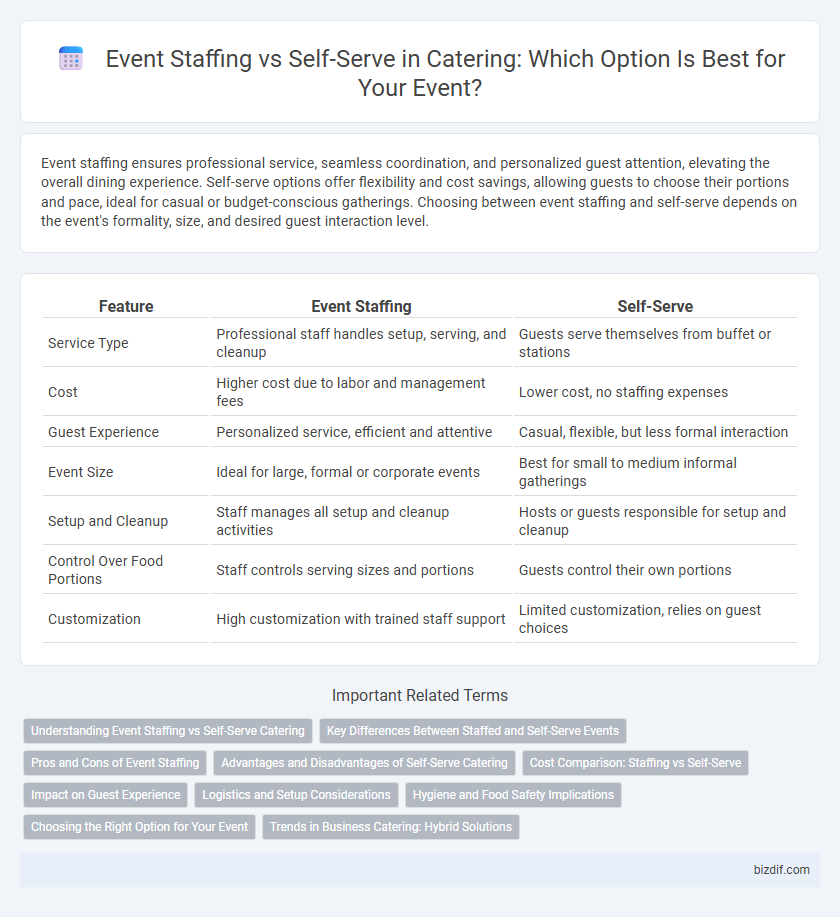Event staffing ensures professional service, seamless coordination, and personalized guest attention, elevating the overall dining experience. Self-serve options offer flexibility and cost savings, allowing guests to choose their portions and pace, ideal for casual or budget-conscious gatherings. Choosing between event staffing and self-serve depends on the event's formality, size, and desired guest interaction level.
Table of Comparison
| Feature | Event Staffing | Self-Serve |
|---|---|---|
| Service Type | Professional staff handles setup, serving, and cleanup | Guests serve themselves from buffet or stations |
| Cost | Higher cost due to labor and management fees | Lower cost, no staffing expenses |
| Guest Experience | Personalized service, efficient and attentive | Casual, flexible, but less formal interaction |
| Event Size | Ideal for large, formal or corporate events | Best for small to medium informal gatherings |
| Setup and Cleanup | Staff manages all setup and cleanup activities | Hosts or guests responsible for setup and cleanup |
| Control Over Food Portions | Staff controls serving sizes and portions | Guests control their own portions |
| Customization | High customization with trained staff support | Limited customization, relies on guest choices |
Understanding Event Staffing vs Self-Serve Catering
Event staffing provides professional servers, bartenders, and coordinators who ensure smooth service and enhanced guest experience, reducing stress for hosts. Self-serve catering allows guests to serve themselves from buffet-style setups, offering a cost-effective and flexible option but requiring more organization and oversight from the event organizer. Choosing between event staffing and self-serve catering depends on event size, budget, and the desired level of service and interaction.
Key Differences Between Staffed and Self-Serve Events
Staffed events provide professional catering personnel who manage food service, ensuring efficiency, presentation quality, and guest assistance. Self-serve events rely on guests to serve themselves, offering convenience and cost savings but requiring clear layout and accessible food stations to prevent congestion. The choice impacts guest experience, service speed, and overall event logistics.
Pros and Cons of Event Staffing
Event staffing ensures professional service, enhances guest experience, and manages food safety, but it increases overall catering costs and requires advance coordination. Trained staff can address guests' needs promptly and maintain smooth operations, yet reliance on personnel may lead to scheduling challenges or staff shortages. While event staffing offers control and quality assurance, it demands higher investment compared to self-serve options.
Advantages and Disadvantages of Self-Serve Catering
Self-serve catering offers cost savings and flexibility by allowing guests to choose portions and customize meals, reducing the need for extensive staff and lowering labor costs. However, it can lead to longer wait times, potential food waste, and less control over portion sizes and presentation, which may affect event flow and guest satisfaction. While ideal for casual events, self-serve catering may not suit formal occasions that require precise service and guest interaction.
Cost Comparison: Staffing vs Self-Serve
Event staffing typically incurs higher costs due to wages, benefits, and training expenses for servers and coordinators, often ranging from $25 to $50 per hour per staff member. Self-serve setups reduce labor costs significantly but may require investment in equipment like buffet tables, dispensers, and reusable dishware, averaging $200 to $500 per event. Choosing between staffed service and self-serve hinges on balancing the increased convenience and customer experience of professional staffing against the budget-friendly benefits of a self-serve model.
Impact on Guest Experience
Event staffing enhances guest experience by providing personalized service, ensuring timely assistance and maintaining smooth event flow. Self-serve options offer convenience and flexibility, allowing guests to choose at their own pace but may lead to longer wait times and reduced interaction. The choice between staffing and self-serve directly influences guest satisfaction, engagement, and overall event atmosphere.
Logistics and Setup Considerations
Event staffing ensures seamless logistics and setup by providing trained professionals to manage food service, guest assistance, and timely coordination, reducing the risk of delays and errors. Self-serve options simplify setup but require clear layout planning, adequate signage, and accessible stations to maintain flow and minimize congestion. Choosing between event staffing and self-serve depends on event size, complexity, and desired guest experience, with staffing offering greater control and efficiency in logistics.
Hygiene and Food Safety Implications
Event staffing in catering ensures strict adherence to hygiene standards and food safety regulations, reducing the risk of contamination through trained personnel managing food handling and serving. Self-serve options increase the potential for cross-contamination and improper food temperature control, as guests may not follow hygiene protocols consistently. Implementing professional event staffing minimizes foodborne illness risks by maintaining supervised sanitization practices and controlled serving environments.
Choosing the Right Option for Your Event
Selecting the appropriate event staffing versus self-serve option depends on the event's scale, budget, and guest experience expectations. Professional event staffing ensures smooth service, enhances guest satisfaction, and manages logistics efficiently, ideal for upscale or large gatherings. Self-serve setups reduce costs and encourage guest interaction but require careful planning to maintain flow and cleanliness.
Trends in Business Catering: Hybrid Solutions
Hybrid solutions in business catering increasingly combine event staffing with self-serve options to enhance flexibility and efficiency. Trends show companies prefer customized setups where professional staff manage premium service areas while attendees use self-serve stations for quick access to food and beverages. This model optimizes guest experience and operational costs, meeting diverse preferences in corporate events.
Event staffing vs Self-serve Infographic

 bizdif.com
bizdif.com